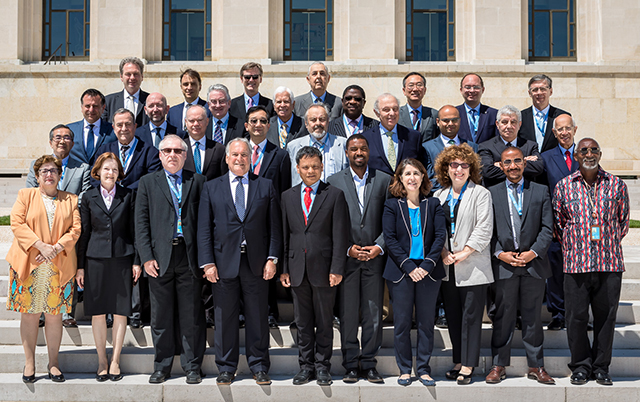By: Freya Doughty, JSD Candidate, Washington University School of Law
On June 23, 2020 Tijjani Muhammad-Bande announced the formal postponement of the International Law Commission’s 72nd Session, a first in the history of the ILC. It is currently unknown when this session will commence, but is likely to follow in the footsteps of the General Assembly’s “slimmed down affair” with world leaders primarily contributing via video link.

As the recipient of the Harris Institute’s Dagen-Legosmky Fellowship to work as a research assistant at the ILC this summer, I was fortunate enough to be afforded the opportunity to work as a research assistant for ILC member Professor Charles C. Jalloh at this year’s ILC session in Geneva. However, safety prevailed and I have instead been conducting research from my home in St. Louis. Before the indefinite postponement, we were working on the topic of atmospheric protection.
Protection of the atmosphere was first included in ILC discussions during the 65th Session, with Shinya Murase elected Special Rapporteur. The Commission decided to limit the remit of this topic, so as to not “interfere with relevant political negotiations” including forgoing the polluter-pays principle, ignoring certain substances such as black carbon, and ensuring this project did not seek to “impose on current treaty regimes.” However, in 2020 the Special Rapporteur opted to remove these exclusions – a welcome edit given said principles are not just fundamental to developing countries, they are “integral to the emerging law concerning the protection of the atmosphere.”
An absence of protectionary terms concerning developing countries appeared to be a theme throughout the report of the Special Rapporteur, and that of commentaries submitted by States (of 13 States to submit comments, Togo was the only State representing the African group). Using the draft preamble as an example, Antigua and Barbuda took issue with the lack of an explicit reference to low-lying States and their specific vulnerabilities. Draft Guideline 4 suggests environmental impact assessments should only be undertaken after adverse consequences have occurred, rather than an atmospheric derogatory action automatically prima facie triggering an obligation to conduct an impact report. Further, Draft Guideline 8 (international cooperation) reflects a duty found in several other international instruments, including the United Nations Framework on Climate Change and the Nagoya Protocol. Both of these give recognition to the special situation of developing countries, and yet it is absent from this guideline. Lastly, Draft Guideline 9 seems to suggest the special consideration required for small island developing States will only be given if they are affected by sea-level rise. The impacts of anthropogenic climate change are not restricted to sea-level rise, plus these consequences disproportionately impact small island developing States. Any guideline that attempts to limit their environmental protection should be actively avoided.
Having the chance to research with Professor Jalloh and see the workings of the International Law Commission through his lens has been an eye-opening and incredible experience I will treasure. When the 72nd Session recommences, I look forward to assisting Professor Jalloh again, albeit likely from Missouri. Thank you to the Harris Institute, Professor Sadat, and Professor Jalloh for this opportunity.
